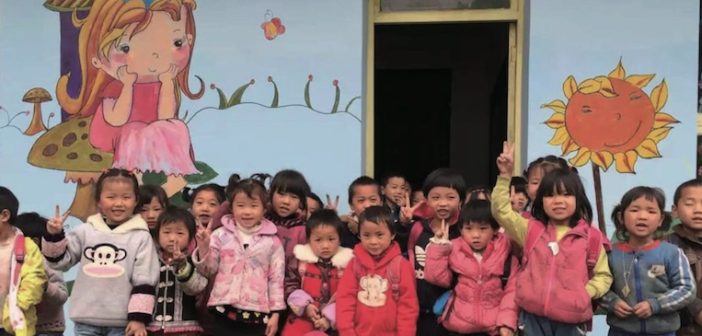A rigorous evaluation of ACTAsia’s Caring for Life program (CLE) has determined that our humane education syllabus is shaping the values of the children taking part.
Throughout the 2014/15 school year, three linked research studies assessed the attitudes of first and second-grade children and their teachers in schools across China. The evaluation looked at changes to the children’s prosociality (their choice to behave in ways that benefit others), their levels of disruptiveness, and their understanding of issues addressed in the CLE program. A control group of counterparts who had not participated in the program were used for comparison.
Three sets of extremely positive results are instrumental in confirming the continuation and future expansion of the CLE program to more schools in China in the future.
Study 1 found that children taking part made significant gains in prosociality and understanding of CLE issues. It also found a slight reduction to general disruptiveness among the students.
Study 2 focused on a sub-set of these students who were closely matched with the control group, which helped to account for the influence of extraneous factors on the results, and confirmed the findings of Study 1.
Study 3 assessed whether second-grade students show further benefit from an expanded CLE program, the results of which found more improvements among children who studied the more in-depth syllabus. A greater understanding was particularly marked in animal sentience and responsible pet ownership.
Please click on the image below for more detailed information.
While the study has given clear assurance of the effectiveness of the CLE program, perhaps the most persuasive findings have been in the words and actions of some of the children themselves.
At a primary school in Zhuhai (Guangdong), a principal recently received a letter from a student participating in the CLE program. Moved by the girl’s new-found empathy and understanding, the principal shared the letter with ACTAsia to impress the value of our humane education lessons.
The 12 year old girl had witnessed a disturbing scene among a group of her peers out of school hours, and was so affected by what she saw that she took up the issue with the principal of the school.
 Her letter begins “I think students still need to improve their moral civilization accomplishment, because they often behave well in school, but not the same outside school.” Her report goes on to describe four boys torturing and killing frogs in the grounds of the temple next to their school, finding entertainment in their merciless pursuit of forcing frogs out of the undergrowth and beating them to death with sticks. “Because of the pain,” she writes, “the frogs cried throughout the process. I was scared to stop them, as there were four boys and I am a girl on my own. But I am upset with myself that I didn’t have the courage to stop them.”
Her letter begins “I think students still need to improve their moral civilization accomplishment, because they often behave well in school, but not the same outside school.” Her report goes on to describe four boys torturing and killing frogs in the grounds of the temple next to their school, finding entertainment in their merciless pursuit of forcing frogs out of the undergrowth and beating them to death with sticks. “Because of the pain,” she writes, “the frogs cried throughout the process. I was scared to stop them, as there were four boys and I am a girl on my own. But I am upset with myself that I didn’t have the courage to stop them.”
She continues, “Dear principal, this is not the only negative event outside school. Children are fighting, leaving litter everywhere, yelling swearwords, and many more disruptive social behaviors… The crime committed by those four boys has left an unforgettable scar in my heart… Outside school, some students may behave very differently. Please pay attention to it. I hope no one will be spiritually hurt by another student’s negative behavior.”
Other anecdotes include a group of children attempting to care for an injured stray dog stuck in a ditch near their school, until a sympathetic CLE teacher was made aware of the situation and adopted the dog herself. And another young student who assumed a tank of turtles that appeared in the family kitchen had been bought as pets. When he found his parents intended to make the animals into turtle soup, in the hope they would fortify his own ailing health and strength, he was horrified. It was to his parents’ great surprise that their son refused to eat the soup, stating how animals have feelings too.
Caring for Life is exactly what ACTAsia’s young students are beginning to do. In introducing a model of prosocial behaviour, our humane education program is freeing the natural empathy children have for animals, and allowing them to speak up on behalf of others.







